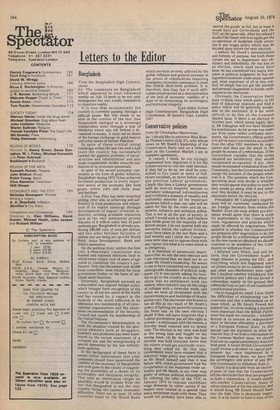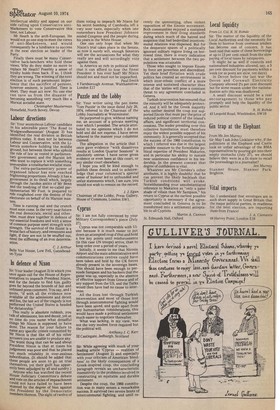Conservative policies
From Sir Christopher Masterman Sir:1 should like to reinforce Miss Brenda Thomas's letter (July 27), with whose views on Mr Heath's leadership of the Conservative Party and on a referendum on the Common Market I am in complete agreement.
It cannot, I think, be too strongly emphasised how important it is for the Conservatives to win the next election. If they fail to do so, we shall be committed to five years or more of fullblown socialism, as never before under any previous Labour government. Clearly this time a Labour government with an over-all majority intends to introduce widespread nationalisation and to enforce a measure of equality and uniformity whereby all the important decisions which a man can take will be taken for him by the state and 'all enterprise, initiative and ambition stifled. That is not at all the sort of society in which 1 would wish to live, and I believe that holds good for the majority of the British people. I do not quarrel with the measures which the Labour Government have taken in the last three and a half months and I think the Conservatives were wise not to oppose them with any vigour. It is what is to come which is so dangerous.
It. is therefore of paramount importance that we win the next election and I am convinced that we shall not do so under Mr Heath's leadership. He seems to me to have committed two major and unforgivable blunders of political judgment. (1) It was surely asking for trouble to go to the country at a time when there was no settlement with the miners, when industry was on the verge of collapse with a three-day week, and when we were all threatened with the • inconveniences and hardships of drastic power cuts. The electorate was bound to see all this as the result of Mr Heath's policy of fighting the powerful unions to the bitter end. At the next election I doubt if they will have forgotten that a Labour government put all this right in a week — a settlement with the miners, a five-day week restored and no power cuts. The election in my view was held at the wrong time and fought on the wrong issue. (2) By the time the last election was held everyone knew that the miners would get practically everything they asked for. By that time Government must have realised that a statutory wage policy was unworkable, as Mr Heath himself said that it was before 1970, unless government had the co-operation of the moderate trade unionists, and Mr Heath, in my view, was guilty of serious political misjudgment by refusing the offer of the TUC in January 1974 to restrain exorbitant wage demands by other unions if the miners were treated as a special case and a settlement made with them. They would not probably have been able to
'deliver the goods' in full, but at least it would have put Government and the TUC on the same side. After his refusal I doubt if Mr Heath will ever again get the co-operation of moderate trade unionists in any wages policy which may be decided upon before the next election.
I admire Mr Heath's determination and honesty of purpose, but both these virtues are apt to degenerate into obstinacy and inflexibility. He has lost us an election, which need never have been; he has committed two major mistakes in political judgment; he has antagonised moderate trade union opinion and, most important of all in this context, he simply has not got the warmth and personal magnetism to kindle enthusiasm in the electorate.
Obviously the Conservative Party must re-think their whole policy in the field of industrial relations and find a policy which will be generally acceptable to the electorate. It is far more difficult to do this on the Common Market issue. If there is an election in October next, which seems highly likely, Mr Callaghan will not have finished his negotiations. As far as one can make out from some rather confused statements, the Government's official policy is to get as many concessions as possible from the other EEC members by negotiation and then put the result to the people by means of a referendum. If the Government consider that the terms obtained are satisfactory, they would recommend acceptance; if not, they would recommend withdrawal from the Community, but the Government would accept the decision of the people whatever it is. The question which the Conservatives must now decide is whether they would oppose this policy or how far they would go along with it and whatever they decided, it must be put to the electorate before the election.
Presumably Mr Callaghan's negotiations will be continued, conducted by the Foreign Secretary from within the Market. Even the most ardent pro-European would agree that there is room' for improvement in the Community's rules, regulations and policies which might be effected by negotiations. The question is whether the Conservatives are prepared after negotiation to let the people decide by a referendum whether on the new terms so obtained we should continue to be members of the Community or withdraw from it.
I believed very firmly, and still believe, that the Government made a tragic mistake in joining the EEC, and everything which has happened since we joined seems to me to confirm that I and other anti-Marketeers were right. But I doubted whether withdrawal was practical politics and I did not favour a referendum mainly on the ground that referenda form no part of our traditional constitutional practice.
I have changed my mind. I now think the difficulties of withdrawing can be overcome and that a referendum on an issue which, as Mr Enoch Powell has pointed out, involves making a decision more important than the British Parliament has made for centuries — whether Britain is to remain an independent state or become ultimately a province of a European Federal State. In this special case the argument so often advanced, that, if we hold a referendum art the Common Market issue, we should hold one on capital punishment does not hold good. A future British Government could reverse a decision on capital punishment but, once imprisoned in a European Federal State, we have lost the sovereignty and power of any British Government to withdraw from it.
Clearly it is desirable from an electoral point of view that the Conservatives tell the electorate that they are prepared to hold a referendum. It would satisfy anti-market Conservatives, many of whom abstained at the last election, and it would bring Mr Enoch Powell back into the fold. This is obviously imP01' tant. It is far better to have a man of his
intellectual ability and appeal on our side calling upon Conservative antiMarketeers to vote Conservative this time, not Labour.
Mr Heath is the arch-European. He would not go one step to meet the views of anti-Marketeers, and would consequently be a hindrance to success at the next election as leader of the Party.
Finally there must be many Conservative back-benchers who hold these views. Why do they make no move to replace Mr Heath? Possibly a sense of loyalty holds them back. If so, I think they are wrong. The winning of the next election is of such paramount importance that the sacrifice of persons, however eminent, is justified. Time is short. They must act now. No one else can save us from the disaster of becoming something very much like a Marxist socialist state.
Christopher Masterman Hornefield, North Bovey, Devon

































 Previous page
Previous page